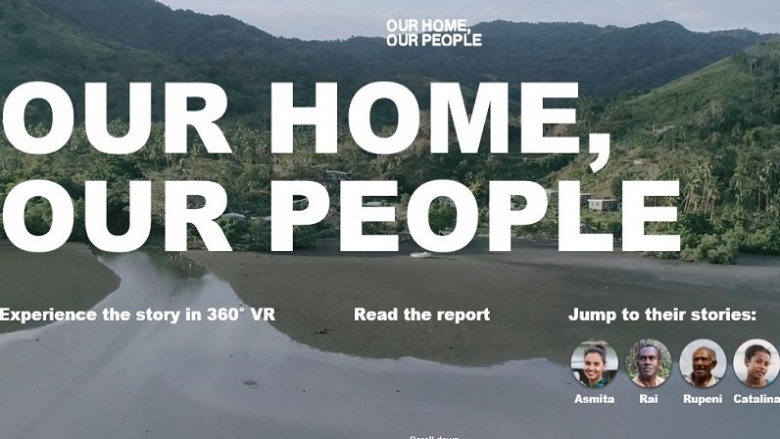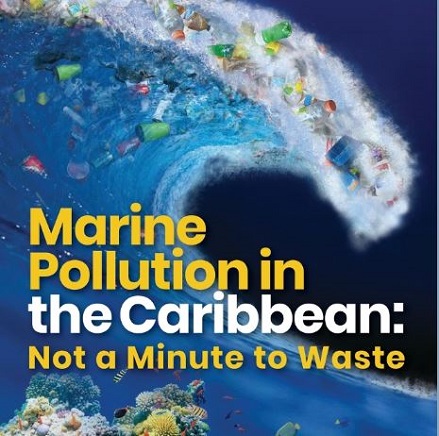Issues for Discussion:
Related events - watch online:
From Source to Sea: Challenge of Plastics Pollution
Melting Himalayan Glaciers: People, Environment, Economies
Related publications and videos:


Download the Chairman's Summary
Representatives of the Small States Forum (SSF) met on April 13, 2019 in Washington, DC during the 2019 World Bank-IMF Spring Meetings. This was the first gathering of small states under Fiji’s leadership. Members of the Forum welcomed the new Chair of the SSF, Honorable Minister Aiyaz Sayed-Khaiyum of Fiji, who took over from Prime Minister Keith Mitchell of Grenada in October 2018.
SSF Chair Sayed-Khaiyum opened the Ministerial Roundtable by congratulating Grenada for their excellent leadership over the last two years. He also thanked the members of the Forum for their support and highlighted the importance of inclusivity across all types of small states, whether they are islands or landlocked.
In his opening remarks, Sayed-Khaiyum emphasized: 1) the global commitment to sustainable development and the continuing battle against climate change; 2) the impact of natural disasters which reverse years of development progress in small states; 3) the need for proactive planning and investment in adaptation and resilience; 4) the need to explore alternative financing solutions that reduce the need for small states to take on more debt, including insurance options, green bonds, blue bonds and catastrophe draw-down options as well as blended finance; 5) the importance of taking a holistic approach, including using climate vulnerability assessments, to establish platforms for accessing concessional resources and drawing on support from partners; 6) the need to bolster action on the Ocean given small states’ dependence on the Ocean and ocean-related activities and the critical role it plays in regulating the global climate system; and 7) the need for small states to become smarter and more agile if they are to overcome the many development constraints that they face.
Manuela Ferro, World Bank Vice President of Operations Policy and Country Services (OPCS) provided an overview of recent developments in the World Bank Group’s support for small states. Today, 23 SSF members – many of them middle-income countries – have access to IDA. Under IDA18, core allocations for small states have, on average, doubled –– with many small states even seeing a tripling of resources compared to IDA17. Ms. Ferro also highlighted that the Small Island Economies Exception provides the most concessional terms IDA has to offer, i.e. 40 years repayment, 10 years grace, and no interest. 15 middle-income country small island states are eligible for these terms. Most recently, the World Bank Board approved the introduction of exit and entry criteria for the small island economies exception which will provide greater transparency for IBRD-only countries to benefit from the exception based on their vulnerability to natural disasters and climate change. As part of this decision, Fiji will now also have access to IDA.
Ms. Ferro also highlighted the recent IBRD capital package increase, which includes specific policies for IBRD-eligible small states –– such as a doubling of the IBRD base allocation and a waiver of maturity premium increases. The World Bank has also introduced several innovative financing mechanisms to support climate resilience aimed at helping countries quickly respond to disasters when they strike. Through the IFC, the World Bank Group (WBG) is fostering private finance, including using the IDA private sector window, and MIGA is also engaging more in small states through the provision of political risk insurance. Ms. Ferro also referred to the ongoing work at the IMF to incorporate natural disasters into macro-fiscal frameworks, and at the Caribbean Development Bank, which is providing concessional financing and emergency relief grants for small states. Ms. Ferro also pointed to the Asian Development Bank, which is engaging with small states through enhanced allocations and increased presence on the ground in the Pacific.
Below are highlights from the three thematic sessions of the Ministerial Roundtable: 1) Blue Economy and Marine Pollution; 2) Adaptation and Resilience; and 3) Economic and Financial Sustainability.
1. Blue Economy and Marine Pollution
WBG management presented how it is providing support to the Blue Economy and addressing marine pollution in small states. Ms. Kemper, World Bank Senior Director for Environment and Natural Resources, outlined the World Bank Blue Economy Action Plan and provided several examples of how the Bank is investing in the Blue Economy. These include: 1) the South-West Indian Ocean Fish (SWIOFish); 2) the Blue Bond in the Seychelles; and 3) PROBLUE which is a program in partnership with Iceland, Norway, Sweden, France, Germany, the European Commission and the US. Ms. Kemper also stressed marine pollution’s critical threat to the Blue Economy, with countries relying on healthy coasts for fisheries, tourism, and competitiveness. In her presentation, Ms. Kemper referred to the recently published WBG report on marine pollution in the Caribbean, “Not a Minute to Waste”, which proposes a 12-point action agenda to address this threat and progress the Caribbean’s transition towards a Blue Economy.
During his remarks, the Honorable Minister of Foreign Affairs for Iceland, Mr. Gudlaugur Thor Thordarson, praised the Bank’s growing emphasis on oceans and the PROBLUE initiative, of which Iceland is a core founding member. He emphasized the need to bring climate aspects into the ocean agenda and the need to find solutions for plastic pollution. The Minister also emphasized that partnerships are essential in tackling these issues.
Mr. Didicus Jules, Director General of the Organization of Eastern Caribbean States (OECS) emphasized the importance of the Blue Economy in the region, outlining several initiatives that the Caribbean is pursuing towards a Blue Economy agenda and the prevention of marine pollution. These include the adoption of the Eastern Caribbean States Regional Ocean Policy (ECROP), the Caribbean Regional Oceanscape Project (CROP), the Caribbean Catastrophe Risk Insurance Facility (CCRIF), and the Caribbean Oceans and Aquaculture Sustainable Facility (COAST). All initiatives have been in partnership with the WBG.
2. Adaptation and Resilience
WBG management presented how it is making adaptation and resilience a key priority of its action plan on climate change for both small island developing states and landlocked small states. Mr. John Roome, World Bank Senior Director for Climate Change, outlined how the WBG will ramp up its adaptation climate finance to reach $50 billion over FY21– FY25 from IBRD, IDA, IFC, and mobilized private finance. This will include bringing adaptation and resilience on a par with mitigation on the public side of financing and crowding in private financing such as insurance mechanisms. The WBG is also increasing the range of instruments such as the catastrophe deferred drawdown options (CAT-DDOs) and mobilizing additional climate finance through green bonds and blue bonds. Mr. Roome also referred to the importance of the whole-of-government approach, which will facilitate the integration of adaptation and resilience into the overall planning system of government and pointed to Fiji’s 2017 Climate Vulnerability Assessment (CVA) as a leading example.
During his remarks, the Honorable Minister of Finance for Seychelles, Mr. Maurice Loustau-Lalanne, described how many small states are economically, culturally, and environmentally vulnerable to the potential effects of climate change and its associated extreme events. He noted that the impact of climate change on coastal livelihoods due to rising sea levels, storms, tidal surges, and flooding will have serious consequences for economies. He mentioned some of the innovative financing mechanisms that Seychelles has embarked on, such as debt-for-nature swaps and blue bonds. In addition, the Honorable Minister called for a more scientific approach to tackling marine pollution, referring to the Seychelles Marine Spatial Planning initiative – a government-led process that uses an integrated multi-sectoral approach to address climate change adaptation, marine protection and the Blue Economy.
3. Economic and Financial Sustainability
The WBG presented how it is supporting small states clients to improve economic and financial sustainability, increase resilience and strengthen debt management capacity. Mr. Marcello Estevao, Global Director for Macroeconomics, Trade and Investment, noted that small states need both long-term financing to build resilience to shocks and quick-disbursing funds to meet disaster costs. At the same time, the Bank highlighted challenges to accomplishing these goals, noting that fiscal space to build resilience is constrained by heightened debt vulnerabilities. To this end, the World Bank and the IMF are working together on a multi-pronged approach to address debt vulnerabilities through: 1) early warning systems; 2) debt transparency; 3) debt management capacity; and 4) debt policies.
Mr. Johannes Zutt, Director of Strategy, Results & Risk in the World Bank’s OPCS Vice Presidency, presented the WBG’s comprehensive support to building resilience in small states through development financing, policy advice, capacity building, and disaster financing mechanisms. Mr. Zutt also highlighted how IDA financing to small states has grown significantly, and reaffirmed the WBG’s continued strong support to small states through IDA19, particularly through policy priorities such as climate action, debt transparency and domestic resource mobilization.
During his remarks, the Honorable Minister of Development Planning for Lesotho, Mr. Tlohelang Peter Aumane, highlighted the importance of promoting private sector development and enhancing an investment climate for private sector growth. The Honorable Minister also stated the importance of investing in critical economic infrastructure and human capital, particularly youth.
During his remarks, Jamaica’s Honorable Minister of Finance, Nigel Clarke, underscored the role played by macroeconomic stability and financial protection as a prerequisite for economic resilience. The Minister presented how Jamaica has embarked on several structural reforms which have considerably reduced its debt-to-GDP ratio. This debt reduction has unleashed a period of economic opportunity through low inflation, economic growth, and the ability to expand social and physical infrastructure. To compound on these advancements, the Minister emphasized the importance of continuing to work with multilateral and bilateral partners to prevent vulnerability to natural disasters.
Conclusion
Ms. Ferro commended the Chair for his excellent Chairmanship and underscored the value of the SSF for identifying issues, amplifying voices, and sharing experiences. She noted that the experiences across the income spectrum point to the importance of fiscal discipline and the quality of expenditure in building resilience. She also highlighted the usefulness of the open exchange to help think through instruments and tools that can be customized to solve problems faced by small states, together with other development partners.
SSF Chair Sayed-Khaiyum closed the Ministerial Roundtable by stressing the importance of working together to achieve tangible outcomes over the next two years, drawing attention to the political momentum around the Climate Summit and the synergies between the World Bank, IMF and the UN. He also urged the active engagement of small states, suggesting that a working group of the small states – comprising of at least five member countries – be mobilized to chart the way forward for the SSF and achieve quick and tangible results for its member countries.
Agenda for 2019 Ministerial Roundtable on Small States
Call to Order and Welcome: Manuela Ferro, Vice President, Operations Policy and Country Services
Welcome & Opening Statement: Hon. Aiyaz Sayed-Khaiyum, Fiji, Chair of Small States Forum
WB Support to Small States - Recent Developments & WB priorities: Manuela Ferro
Closing Remarks - Manuela Ferro
Closing by Chair of the Small States Forum, Hon. Aiyaz Sayed-Khaiyum